|
Biographical Log of Michael Furstner - Page 88
2008 ||
2009 :
Jan |
Feb |
Mar |
Apr |
May |
Jun |
Jul |
Aug |
Sep |
Oct |
Nov |
Dec | Page :
Previous |
Next |
Most Recent -
Next -
Previous -
Page 1 -
Photos -
Index -
Topics -
MP3s -
Jazclass Links
Saturday & Sunday May 16 & 17, 2009
(diary, Louise Erdrich, memories)
Saturday morning I drive to Nightcliff for another swim, then a sushi lunch in
Casuarina, before heading towards the Darwin Bridge Club for this afternoon's competition.
Dev who agreed to play with me, is already there when I arrive. At first we are
struggling to find one another's style of play, but halfway through things start to improve
gradually. Overall not a good performance though. But no doubt we will do better next week.
Sunday morning I watch as usual the Insiders program on ABC TV and on the
Sport segment the subject of last Monday's Four Corners
program is discussed at length. The general consensus of the journalists is that we have
reached a watershed for the moral conduct towards woman of players in all football
codes. Will this prove to be true or are we having "just another wake up call when
nobody wakes up" ??
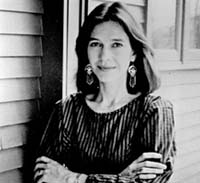 After lunch in Palmerston I go to the Library to exchange some books. My eyes are attracted by a rather
unusual tittle The Master Butchers Singing Club by Louise Erdrich, an
author from German descent but living in Minnesota (USA).
After lunch in Palmerston I go to the Library to exchange some books. My eyes are attracted by a rather
unusual tittle The Master Butchers Singing Club by Louise Erdrich, an
author from German descent but living in Minnesota (USA).
Now into my early 70s and still healthy I feel I am going through one of the best periods of
my life. No more anxieties, responsibilities, pressures and restrictions from work or
worries about money. I am free to do what I like each day and full of memories of a
very interesting and varied life behind me. These can be triggered off by the most trivial
things.
Die Gedanken sind frei
Wer kann sie erraten
Sie fliehen vorbei
Wie nächtliche Schatten
Kein Mensch kann sie wissen
Kein Jäger erschiessen
Es bleibet dabei
Die Gedanken sind frei....
|
|
|
Back home I open Louise Erdrich's book. The first page contains as preamble a German
song ("Thoughts Are Free"), Louise's father used to sing to her. I know it well as I too
have sung it often, so many many years ago.
This happened during the summer camps near the small North Sea seaside village of
Vrouwenpolder on the island Walcheren of Friesland, the far South Western
province of The Netherlands.
The camps were organised by the Vrije Jeugdkerk ("Free Youth Church") in
Rotterdam. I joined the summer camps as a teenager from age 14 to 20, and although already
becoming an agnostic during that period I thoroughly enjoyed the camps.
|
We lived in tents on a meadow right behind the dunes, through which a narrow track led to
the beach where we had our daily morning swim. The days were well organised with a set
structure every day.
The social centre of the camp was the heksen kring ("Witches
circle"), a large circle formed by tied bunches of twigs, on which we sat during
breakfast, lunch, afternoon tea, dinner and later in the evening, then with a campfire in
the middle. This was where we sang at all occasions from Het Kampse Lied a bundle
of songs in Dutch, English (including Scottish songs and Negro Spirituals), German, French, Italian put together by some of the founding
members of the Vrije Jeugdkerk. "Die Gedanken sind frei" was one of them.
There were separate boys and girls camps located about 500 metres apart. But we would come
together at least once every day for the ritual Elf Uur Moment ("Eleven O'clock
Moment"), when we marched towards each other carrying the eleven Provincial Flags meeting
halfway and holding a minute silence (lowering the flags) to reflect on the wars and disasters around the
World. We would look out of the corners of our eyes at the girls, when lucky exchanging quick shy smiles with the
one we fancied. There were also a few social occasions when we met around the camp fire in
the evening.
This is how I met one of my first girl friends
Ariette van Rossum, a young ballet dancer who in her late teens joined the
Amsterdam Ballet. But because the focus of her life (we then thought) was to remain
in Holland, while I as a young geologist planned to leave the country, even Europe,
possibly forever, the relationship ended with some regrets on both sides.
How surprised
I was therefore to meet her again (now as Ariette Taylor), almost 25 years later in
Adelaide in 1980. She had met and
married in the 60s the then young English ballet choreographer Jonathan Taylor during his stint
with the Amsterdam Ballet. After some time in England they migrated to Australia where
Jonathan was offered the post of Artistic Director of the Adelaide Dance Theatre
which he elevated to worldwide fame with his modern productions in the 1980s. Ariette too
was active in ballet especially working with young people. We met up a few times but
through pressures of her work and my music study we lost touch.
Most Recent -
Next -
Previous -
Top -
Page 1 -
Photos -
Index -
Topics -
MP3s -
Jazclass Links
Monday May 18, 2009
(diary, Louise Erdrich, memories)
Last night I watched on SBS TV the Eurovision Song Festival held in Moscow this year
and was most impressed. The contest opened and closed with mesmerising performances by the
Cirque du Soleil. The song
presentations from the 25 finalist countries themselves were also outstanding and the songs,
without exception, were all pretty good. I felt very much heartened by the exuberance and
happy energy radiating from all those young performers. They strangely made me feel proud
to be a European.
Today another quiet day. In the afternoon there is a refreshing downpour of rain but only
in a small area inland where I am, not in Darwin itself as I later discover. Bridge with
Mairead in the evening is again most pleasant.
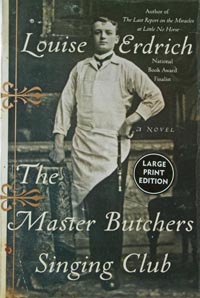 Only a dozen pages into The Master Butchers Singing Club I get another memory flash
back :
Only a dozen pages into The Master Butchers Singing Club I get another memory flash
back :
The main character of the book, Fidelis Waldvogel, a young
qualified master butcher, has, after three years serving as a sniper in WW1, just returned
to his village in Germany. One day one of the villagers receives a parcel sent from the USA
containing a loaf of bread. He shows a slice of it on the village square to some of his
friends. Fidelis admires the perfectly machine cut square piece of white bread with
its gold brown evenly coloured crust and beautifully soft white texture. He is most
impressed and over a few months the experience gradually instills in him the desire to go
where that bread came from and soon after migrates to the USA.
Towards the end of WW2 I and my family were staying with my German grandparents in Wismar. By the Spring in 1945
the Russian army was rapidly approaching from the East, while the Allied forces advanced
from the West, with us slap bang caught in the middle.
My parents decided this was not a very safe place to be and we started moving on two
bicycles towards the West. For a short period we stayed at a large farm, but then moved on
farther West to eventually cross the frontline and stopping in a small town (possibly Ratzeburg ?) held by the Allies, by far our preferred option. We then
slowly drove back to Wismar after its capture (from the very bravely defending Hitler
Jugend) by the Allies (see Note).
On our way back to Wismar we drive at
one point alongside a canal (or perhaps narrow river). I am sitting on the back of my
Dad's bicycle looking out over the water and suddenly notice a square piece of
sparkling white bread floating on the surface. I am absolutely amazed. It is the very
first piece of white bread I have ever seen in my life, and to see it carelessly discarded (by the army),
floating away on the water is just incredible. "Is this what peace is all about ?"
goes through my mind.
Later when we are staying in a refugee camp, waiting to be transported back to Holland, I
get to hold a slice of white bread in my hands and eat it, feeling its soft texture in my
mouth and experiencing its great taste. - Not a single food experience throughout the rest of
my life since then has had such an enormous emotional impact on me. And as you no doubt
have gathered from reading my Blog, I much enjoy my food.
In the years just after the war a few other memorable food
experiences occurred : my very first ice cream around 1948 (there was a great scandal
in Holland at the time when one producer made ice cream using rotten duck eggs causing
several food poisonings) and that other American invention making my own ice cream
soda.
And after that my first loempia (giant Indonesian spring roll) around
1952, when the first Indonesian-Chinese restaurant opened in Zutphen right opposite the
entrance of our Hichschool the Baudartius Lyceum. They both too were great
culinary experiences, but they could not match that piece of white bread floating on the
water and into my life.
Note
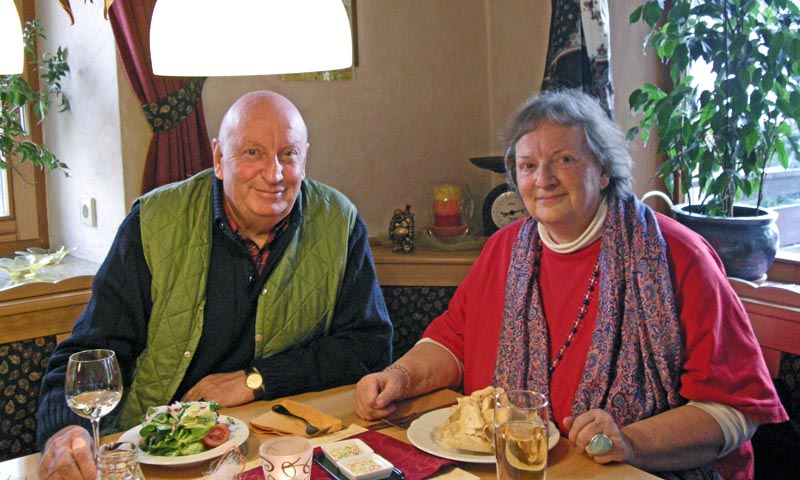 The initial demarcation line between the Russian and Allied armies ran NS a few kilometers
East of Wismar. Much to my parents' anger I marched once or twice with the Allied
replacement guards towards this line and was strictly forbidden to ever attempt this
again.
The initial demarcation line between the Russian and Allied armies ran NS a few kilometers
East of Wismar. Much to my parents' anger I marched once or twice with the Allied
replacement guards towards this line and was strictly forbidden to ever attempt this
again.
Later the official line to become the Iron curtain (shown by thick red
dashes on this map. Also see story) was moved farther to the West
placing Wismar well within the East German zone. My grandparents fled Wismar a few years
later settling in Hannover, losing all their worldly possessions.
Incredibly my sister Wivica managed to reobtain my
grandparents property in 1992, after the Iron Curtain had finally come down (in 1989) and East and West Germany had been reunited.
Most Recent -
Next -
Previous -
Top -
Page 1 -
Photos -
Index -
Topics -
MP3s -
Jazclass Links
Tuesday May 19 , 2009
(diary, memories)
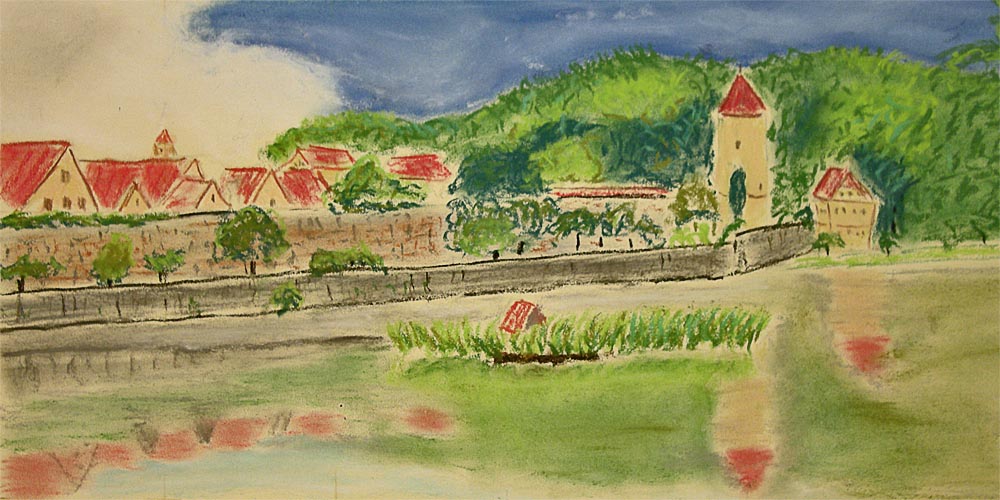 I have my pastel painting class again today. This time the project is to paint something
with a reflection in the water. I took this terrific photo from the Medieval wall and moat
around Dinkelsbühl. I found
this painting not at all easy to do and believed I really stuffed it up, but looking now at
the photo it is not too bad. Anyway, a step in the right direction.
I have my pastel painting class again today. This time the project is to paint something
with a reflection in the water. I took this terrific photo from the Medieval wall and moat
around Dinkelsbühl. I found
this painting not at all easy to do and believed I really stuffed it up, but looking now at
the photo it is not too bad. Anyway, a step in the right direction.
Dinkelsbühl is
one of the main four Medieval towns on the Romantische Strasse which I traveled last
year. From South going Northwards they are Füssen, Nördlingen, Dinkelsbühl and Rotenburg ob der Tauber. Of these I liked Nördlingen best, it was
the least touristic, small and felt very "real". The four towns are spaced at about a day's
soldiers march from one another and all played a significant roll during the 30 years German war
around 1630.
Upon my return home I find that there has been a significant downpour here inland as I step
from my car right into a puddle of water. The night is wonderfully cool and
fresh.
Later I watch a Swedish movie on SBS TV, about a young boy being sent from
Finland to live with a family in Sweden during WW2. Many children were sent across this way
as Finland feared an invasion by Russia.
I identified strongly with the young boy in
the film who felt very awkward in this strange country not fitting in well with the Swedish
children and at school. I felt very much the same when I went to school in Wismar for one
year during WW2 in 1944-45, absolutely hating it in fact.
I received extra private
lessons in German after school from one of the teachers who lived just out of town. I had
to go there once a week and on one occasion was caught unexpectedly by a midday air raid
of Allied fighter planes strafing the streets with bullets. I remember running from one
manhole to the next or sheltering behind big tree trunks to get to her home.
Most Recent -
Next -
Previous -
Top -
Page 1 -
Photos -
Index -
Topics -
MP3s -
Jazclass Links
Wednesday May 20, 2009
(diary)
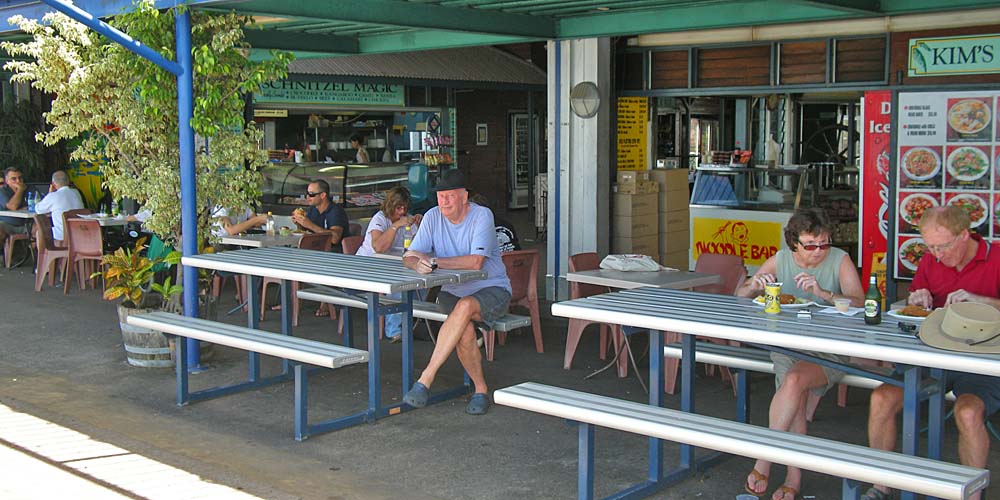 Wednesday is my usual day to the Stokes Hill Wharf for lunch. Before I do I ring the tyre
people, my spare Michelin tyre has arrived. If I got time I will collect it today. After
lunch I drive to Nightcliff for a swim in the pool, 28°C it says on the notice board.
Three degrees warmer than last Saturday. We have had a few warmer days explains the
attendant. Sure but up 3 whole degrees ? Anyway the water feel slightly warmer and is
wonderful. When I get out it is to late to get my new tyre, so I will do that tomorrow.
Wednesday is my usual day to the Stokes Hill Wharf for lunch. Before I do I ring the tyre
people, my spare Michelin tyre has arrived. If I got time I will collect it today. After
lunch I drive to Nightcliff for a swim in the pool, 28°C it says on the notice board.
Three degrees warmer than last Saturday. We have had a few warmer days explains the
attendant. Sure but up 3 whole degrees ? Anyway the water feel slightly warmer and is
wonderful. When I get out it is to late to get my new tyre, so I will do that tomorrow.
In the evening I watch the last episode of the Trawlermen TV series on SBS.
It has been quite a nice series documenting the ups and downs of the trawler fishing boats
on the North Sea and Atlantic. I have really enjoyed it and hope they will produce a new
series soon.
I have this great need to be creative, almost on a daily basis. If I
am I am happy, if not I become frustrated. Fortunately I have a range of different
activities I can immerse myself in : music - writing my Blog - working on new lessons and
courses - painting - photography - playing bridge.
I tend to switch from one to the
other as my mood or fancy changes. So this evening I suddenly feel like writing and playing
some blues. I make a number of recordings and finally select one to upload online : Blu4u, a 12 bar blues in the key of Db. It is OK, I am
quite happy with it. I play and listen to my music until well past midnight, then
make some fried eggs on toast at about 2.30 AM before finally falling into bed.
Comments -
Most Recent -
Next Page -
Previous -
Top -
Page 1 -
Photos -
Index -
Topics -
Jazclass Links
Copyright © 2009 Michael Furstner
|




